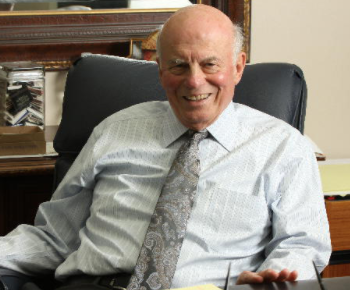
In several recent segments of his top-rated talk radio program Rush Limbaugh has kindly given me credit for pioneering the use of data collection for voter and donor targeting.
And I'm honored by the compliment that Rush offered when he said:
Richard Viguerie is a big name in conservatism. One of the reasons is direct mail. Richard Viguerie found a way to find out more about people and how they're gonna vote and how to persuade them in his era than anybody else had . . .
Now, Part 2 of the backstory of direct mail is that over the 57 years I've been studying direct marketing, I learned direct marketing is more than just a way to raise money - it is the first and most long-lived form of alternative media.
The way I used it - and use it today for our many conservative clients - it is as a form of media; it educates, it informs, it persuades, and it provides news and information that recipients won't get through the establishment media, or the establishment political parties.
And how we grew our files from 12,500 Goldwater donors in 1965 to 12 million conservative activists and donors today has been essential to the rise and maintenance of the modern conservative movement.
The battle over the Panama Canal holds a great example of the role direct marketing played in growing the conservative movement.
As I detailed in my book TAKEOVER, when Jimmy Carter's effort to return the Panama Canal to Panama began to move forward, the Republican National Committee was mailing millions of letters signed by Ronald Reagan asking people to contribute to the RNC in an effort to defeat the Panama Canal treaties.
Approximately $700,000 was raised. But when conservative Senator Paul Laxalt asked RNC chairman Bill Brock for $50,000 to help underwrite the cost of a "Truth Squad" media tour, the RNC chairman refused.
The outrageous fact is that Brock refused to spend any of the money raised by Reagan's anti-treaty letter on any anti-treaty activities. At their insistence, Laxalt and Reagan talked with Brock on December 15, 1977, via a joint telephone call-and came away very angry.
Someone present during this conversation said he heard Reagan use words that he didn't know Reagan knew. But Brock would not budge.
Of course, many suspected that Bill Brock's refusal of the Panama Canal "Truth Squad" had something to do with the fact that as a former U.S. Senator from Tennessee he was very much a part of the Washington establishment, and establishment Republican Senate Minority Leader Howard Baker of Tennessee was willing to go along with Carter and ratify the treaty giving away control of the canal.
My friend and former client, Congressman Phil Crane, who headed the American Conservative Union at the time, then called and asked me to raise the $50,000 Laxalt and Reagan needed to help fund the "Truth Squad."
Instead of raising the $50,000 they asked for, the Viguerie Company, on a pro bono basis, raised over $110,000-one more demonstration of the reduced importance of political parties and proof that direct mail gave conservatives the ability to engage in and finance important political activity outside of the establishment Republican Party.
Naturally, critics will argue that we lost the Panama Canal Treaty fight.
My answer to that is while of course we wanted to win, we also wanted to build a movement.
The Old Right congressional leaders had become defeatist; they were used to showing up and getting beat two to one and then retiring from the fight until the next vote.
The Republican establishment was corrupt, ideologically and otherwise, they were never going to engage the Left in a fight to the finish on any issue.
However, in the same situation, those in the New Right would cinch up their belts, organize, call meetings, develop plans, and send out a couple million letters explaining why the way to win the next battle was to defeat those who voted wrong-be they Democrats or Republicans-and keep pushing forward toward our goal of having conservatives govern America.
So, even though Congress failed the American people and gave away the Canal, through our direct mail campaign the conservative movement grew; hundreds of thousands of people got involved as activists or donors, and thousands had the opportunity to develop leadership skills.
What's more, over the next two election cycles, 1978 and 1980, 20 of 22 senators who supported the Panama Canal Treaty - both Republicans and Democrats - lost their campaigns for reelection.
The same holds true today for the limited government constitutional conservatives of the Tea Party and the conservative populist movement that won President Trump the Republican presidential nomination; every battle we fight, even if we lose, gives us the opportunity to educate voters on the issues, attract new people to our causes and to build new conservative organizations and leaders.